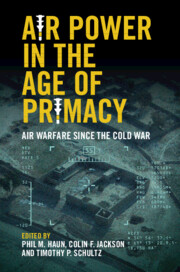Book contents
- Air Power in the Age of Primacy
- Air Power in the Age of Primacy
- Copyright page
- Contents
- Figures
- Tables
- Contributors
- Preface
- Abbreviations
- 1 Air Power in the Age of Primacy
- 2 Remote Warfare: A New Architecture of Air Power
- 3 Deliberate Force: Ambivalent Success
- 4 Hoping for Victory: Coercive Air Power and NATO’s Strategy in Kosovo
- 5 Operation Enduring Freedom
- 6 The Result Is Never Final: Operation Iraqi Freedom
- 7 Israeli Air Force Effectiveness during the Second Lebanon War (2006)
- 8 Libya 2011: Hollow Victory in Low-Cost Air War
- 9 Coercing a Chaos State: The Saudi-Led Air War in Yemen
- 10 Russia’s Air War Win in Syria
- 11 Air Power in the Battle of Mosul
- 12 Retrospect and Prospect: Air Power in the Age of Primacy and Beyond
- Index
11 - Air Power in the Battle of Mosul
Published online by Cambridge University Press: 16 December 2021
- Air Power in the Age of Primacy
- Air Power in the Age of Primacy
- Copyright page
- Contents
- Figures
- Tables
- Contributors
- Preface
- Abbreviations
- 1 Air Power in the Age of Primacy
- 2 Remote Warfare: A New Architecture of Air Power
- 3 Deliberate Force: Ambivalent Success
- 4 Hoping for Victory: Coercive Air Power and NATO’s Strategy in Kosovo
- 5 Operation Enduring Freedom
- 6 The Result Is Never Final: Operation Iraqi Freedom
- 7 Israeli Air Force Effectiveness during the Second Lebanon War (2006)
- 8 Libya 2011: Hollow Victory in Low-Cost Air War
- 9 Coercing a Chaos State: The Saudi-Led Air War in Yemen
- 10 Russia’s Air War Win in Syria
- 11 Air Power in the Battle of Mosul
- 12 Retrospect and Prospect: Air Power in the Age of Primacy and Beyond
- Index
Summary
In June 2014, ISIS fighters swept into Mosul, Iraq’s second-largest city, and easily defeated the Iraqi Security Forces, armed with advanced American weaponry but unready or unwilling to engage in close combat against the Salafist militants. The campaign to liberate Mosul from ISIS may be the purest expression yet of twenty-first-century warfare. It was highly politicized, ideologically charged, fought in a fractured state among civilians by a coalition of the willing, with great power involvement on all sides, exposed to the world on social media. The air war, too, represented an intensification of recent operational trends: enhanced command and control measures, universal employment of precision munitions, increased intelligence, surveillance and reconnaissance capabilities, ubiquity of remotely piloted aircraft, and decreased tolerance for civilian casualties. None of these factors was new in 2016, but each of them was manifested over Mosul to a degree not previously seen.
Keywords
- Type
- Chapter
- Information
- Air Power in the Age of PrimacyAir Warfare since the Cold War, pp. 255 - 278Publisher: Cambridge University PressPrint publication year: 2021

